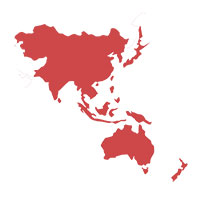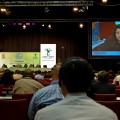China: Annex I or Annex II?
Julian K | December 7, 2011.
Can China still be considered a developing nation? This frequent question in international relations has far reaching consequences, especially at the climate change conference in Durban, South Africa.
Depending on what it is considered, China’s responsibility to contribute towards international efforts to cut greenhouse gas emissions changes. As a developing country, China insists that the principle of ‘common but differentiated responsibilities’ be continued in any global treaty. The principle states that the industrialised nations are historically responsible for emissions causing climate change, having used fossil fuels for economic growth over the last two hundred years. This is unlike developing nations, who have not had the chance to take advantage of this cheap technology. Developing nations assert that they have a moral right to grow their economies and lift their population out of poverty.
Recently, China has had spectacular economic growth, having overtaken Japan as the second biggest economy in the world. Its status as a developing nation is under scrutiny.
At the November APEC Summit in Hawaii, US President Barack Obama reportedly told Chinese Premier Wen Jiabao now that China has “grown up”, it has to act more responsibly. This includes having to bear international obligations, like emission reduction targets to combat climate change.
American chief climate negotiator, Jonathan Pershing, said that the simple separation of rich and poor countries as a concept originated in 1992 is now irrelevant. “Since then the world has radically changed,” and there is no point in arguing on this basis, he said.
British Energy Secretary Chris Huhne agrees, “China clearly cannot say it’s a small developing country. It’s so big, it is a global player.”
China, however, fiercely defended its status as a developing nation. Chinese chief negotiator Xie Zhenhua told the press that, “China remains a developing country. Per capita GDP is only $4,300, and we have 128 million population living within $1 a day.”
In fact, looking at economic indicators per capita, Xie does have a point. The per capita GDP is less than a tenth of that of the US which stands at $47,184.
Outside the economic factors, other measures also render China a developing country. The UN Human Development Index, which includes factors like literacy, life expectancy and education, ranks China 101st in the world.
However, in terms of CO2 emissions, the numbers tell a different story. Chinese per capita emissions are 5.3 tons compared to America’s 17.9 tons. Conversely they are only approximately half a ton off France’s per capita emissions. China is fast approaching developed world standards.
China is statistically far away from being a developed nation. “China is definitely still a developing nation,” Martin Khor, Executive Director of the South Centre, claimed. He added,”Asking developing nations to contribute to green house gas emission cuts is unfair.” This argument leaves out a very important consideration. China’s GDP per capita may be small, but its geopolitical power is immense; a fact that China has not been shy about.
In recent years China has aggressively increased its military spending. A recent Pentagon report warned of China’s rising military power, claiming that China had closed “key gaps” between it and the US. Furthermore, China has nuclear power and was recently testing its own stealth fighter. When Obama announced the creation of an American military base in Australia, China didn’t hesitate to counter Obama’s advance with strong rhetoric, not leaving any questions about China’s quest for dominance in the region.
The strong Chinese economy also increases its international power. China finances more than a trillion US dollars of American debt and is the world’s biggest holder of American currency.
China clearly has a schizophrenic self-perception. While the 2008 Olympic Games in Beijing were a perfect stage to show its development and economic power, at the climate change negotiations China insists on its backwardness.
Khor argues that an engagement of China, and other emerging economies Brazil and India, in a binding international regime would pressure other developing nations to do the same. “China’s fight to retain its developing country status is of interest to other developing countries, for they will be next if China loses that fight,” he wrote in a recent article. A definition of China as a developed nation would open the door to arbitrary discussions.
Yet no other developing country in the world has China’s enormous power – economically nor militarily.
It is true that China is still a developing country in economic terms, but not so in geopolitical terms. It is time for China to fully engage in its status as a rising world power. Durban can be the first stop.













comment